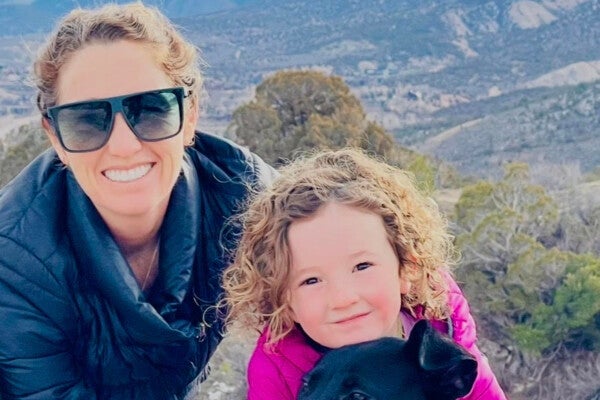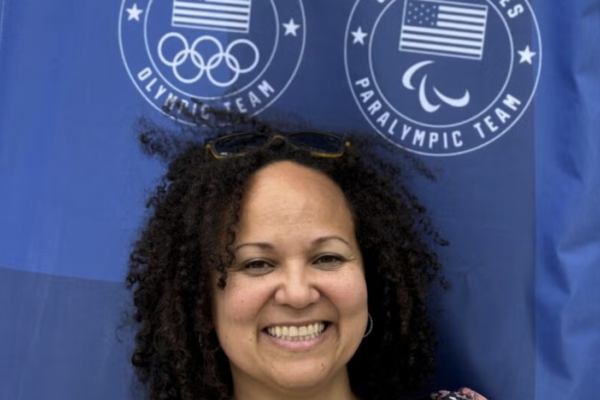Voices of McCombs
In 19 conversations with 37 people from the McCombs community, the award-winning oral history platform StoryCorps reveals the human side of business education.
By Mary Ann Roser
Photographs by Phil Kline
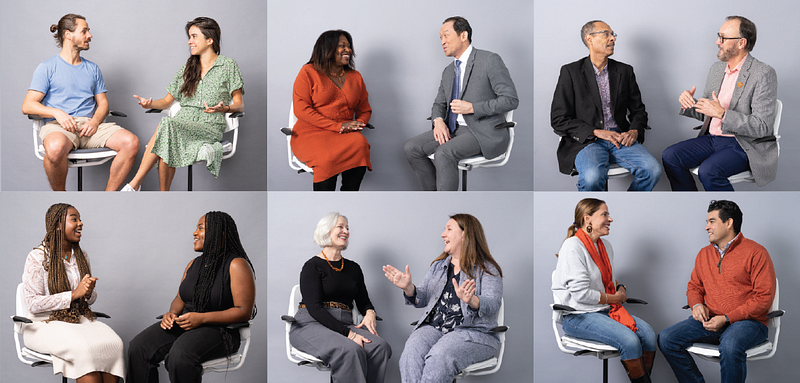
They bonded as McCombs classmates during the pandemic and became the closest of friends before ever meeting in person. Although the two women hail from different worlds, they were united by all they have in common.
Leilani Valdes, a physician pathologist in Victoria, Texas, and Arghavan Nawaby, an Iranian-born scientist who is an assistant director in the Office of Science and Engineering Laboratories at the U.S. Food and Drug
Administration and lives near Dallas, seem like lifelong soulmates, not like relatively new friends connecting in midlife. Had they not enrolled in the McCombs Executive MBA program in 2020, they might never have met.
Relationships like theirs are what McCombs wanted to spotlight when the school invited producers from StoryCorps, the award-winning oral history platform, to campus as part of the school’s 100th anniversary. Their assignment: record diverse stories of courage, community, and change-making, as told in conversation between students, faculty members,
staffers, and alumni.
When StoryCorps brought its microphones to McCombs over two weekends last fall, its staff already knew the organization’s motto
would come true: Everyone has a story. Whether the storytellers were students, faculty, staff, or alumni, they opened up about the hopes,
fears, and lessons learned. For many, McCombs was key in shaping their lives.
Partnering With StoryCorps
StoryCorps often hits the road to record revealing conversations, but other times, universities, corporations, nonprofit groups, and others enlist StoryCorps Studios to come and help them tell stories the organizations deem important.
The goal was to show the human side of business and how McCombs makes an impact. “As we thought about ways to highlight our 100-year history of impact, StoryCorps proved to be a perfect fit for us,” said Yolanda
Urrabazo, director of internal communications, who steered the Voices of McCombs project. “We set out to find untold stories and amplify diverse perspectives that expand our understanding of what business education is about at McCombs.”
The project was an opportunity to open the floor to those who make a profound difference in the everyday lives of people. Whether it was
mentors helping students find their paths or admissions officers on the road, the stories shine a light on McCombs’ human-centered, future-focused core values.
VOICES OF McCOMBS
“When we started with McCombs, we created a shared vision — wanting to take on misconceptions about business school and highlight the spirit of McCombs,” says Sarah Krauss, a New York-based StoryCorps account manager who helped produce the recordings.
A key misconception is that business majors are all about making money. The reality is, “people who go to McCombs are diverse, passionate, and interested in making a difference,” Krauss says.
McCombs Dean Lillian Mills participated and was joined in conversation with her friend and academic peer, Cristi Gleason, a professor of accounting at the University of Iowa Tippie College of Business. “Through this oral history project, we shine a light on the incredible relationships
behind McCombs’ success,” Mills says. “I’m grateful to our community for taking part and especially to my friend, Cristi, who joined me in conversation to reflect on our longstanding friendship and how it’s played a role in my work.”
StoryCorps producers guided and documented 19 conversations involving 37 people representing a cross section of the McCombs community, including staff members and their spouses, such as Charles Enriquez, director of BBA student affairs, and Caroline Enriquez, assistant director of admissions scholarship administration at UT. They celebrated their 17th wedding anniversary by reflecting on their personal history, children, work, and partnership. Friends and longtime colleagues Arthur Allert, assistant dean for undergraduate programs, and Michael Clement, Centennial Professor of Accounting, discussed their work supporting first-generation students, promoting diversity at the Ph.D. level, and their decades-long friendship. Shudde Fath, the school’s oldest alum at the time of recording, joined in conversation with her daughter, Betsy Fath Hiller, two months before Fath’s death. (See story page 18 in this issue.)
Typically, StoryCorps records two people who know each other and ask each other questions. Other times, StoryCorps staffers step in and ask an individual questions. The same day Nawaby and Valdes came in, Krauss interviewed McCombs alum Arthur Mills IV, BBA ’96, MBA ’04, about his ongoing involvement with the school.
“I felt honored and privileged to tell my story,” says Mills, a member of the McCombs Advisory Council and the McCombs MBA Advisory Board. “McCombs was transformative for me. There’s something about the challenge of being in a big space. Taking then-Dean Jay Hartzell’s class was memorable, so was Professor John Doggett and Sandy Leeds and far too many others to mention. I felt the care from these faculty members and realize how phenomenal those relationship have been. I want more people
who look like my wife and me to come here.”
He says that as a Black man, he stays involved with the school to encourage other people of color.
“I want to push and challenge McCombs to be as diverse as it can be,” says Mills, chief operating officer of America’s Promise Alliance, a partnership of more than 400 corporations, nonprofits, faith-based organizations, and advocacy groups seeking to improve the lives of young people. Mills also is the founder and president of Mills Management Group, a boutique
consulting firm.
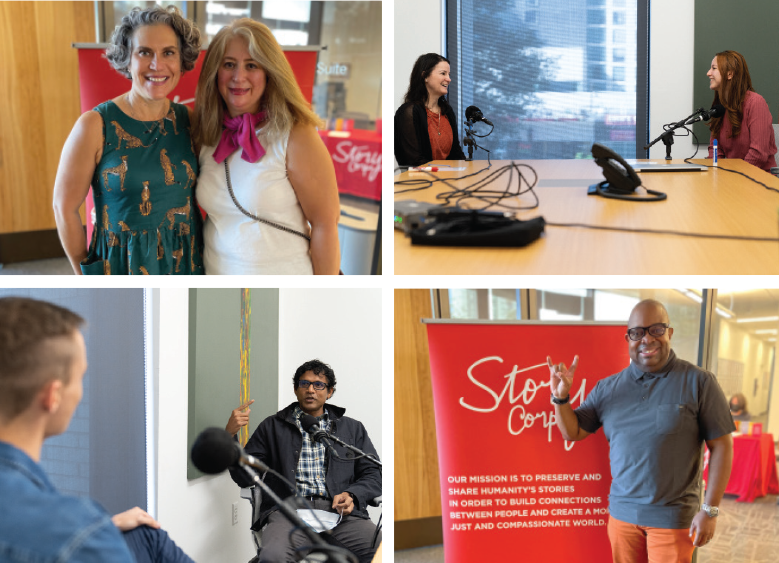
Intersecting Lives
When Valdes and Nawaby met online in 2020 as McCombs classmates, they soon realized they shared similar perspectives on life, family, and service. And they had so many life circumstances in common. Both were married and worked full time in medical-related fields. They each had adult children enrolled at UT. Both had cared for aging parents and had recently
lost their fathers to cancer, Nawaby in 2019 and Valdes in 2017. For each, that loss loomed large and was sometimes part of their daily Zoom conversations as students.
“We spent plenty of time crying on the phone together,” says Valdes, medical director of Regional Pathology Associates and a governor on the
board of the College of American Pathologists. “She gave all of her classmates a sand timer,” Nawaby says. “That’s something else we share,
this concept of time and how no one ever talks to you about dying. Your time is so limited, so make it good. Do something. Be kind.” Valdes told her McCombs classmates about her experience with her father and invited them to call her if they ever needed her help. It was a way to honor her father’s legacy. “He did that for the community,” Valdes says.
“She is the queen of gift-giving,” Nawaby says.
“She gave me a Persian rug,” Valdes immediately responds.
“My father gave small Persian rugs to people who mattered to him,” Nawaby explains. “She always gives me gifts, and she changed my life. So, she got a rug from the region I’m from in Iran. I didn’t even know she liked rugs until she once said to me, ‘I’m going to Turkey to get a rug.’”
In the Executive MBA program from which they graduated in spring 2022, their classmates noted their closeness. “We were voted best friends for life by our class,” Valdes says. They ended up working together on two of the five micro-consulting projects offered through the MBA+ program. Now they are planning to take another course together through McCombs +,
which tailors experiences to professionals and includes seminars with industry experts and access to professional coaches.
Intimate conversations make StoryCorps powerful, Krauss says, and Nawaby and Valdes exemplify that.
StoryCorps recordings go into the nonprofit’s full collection and are archived at the American Folklife Center at the Library of Congress. The platform’s over-arching goal is to build connections between people and inject more justice and compassion into the world. Sharing Nawaby’s and Valdes’ story of friendship contributes to that legacy, Krauss says.
And the two women have inspired another generation to share friendship. Nawaby’s daughter and Valdes’ son — who were students at UT while their mothers were in the Executive MBA program — have become friends.
“It has been a great experience at McCombs,” Nawaby says, sitting beside Valdes.. “I never thought as a scientist I’d be going to business
school and meeting someone like her.”
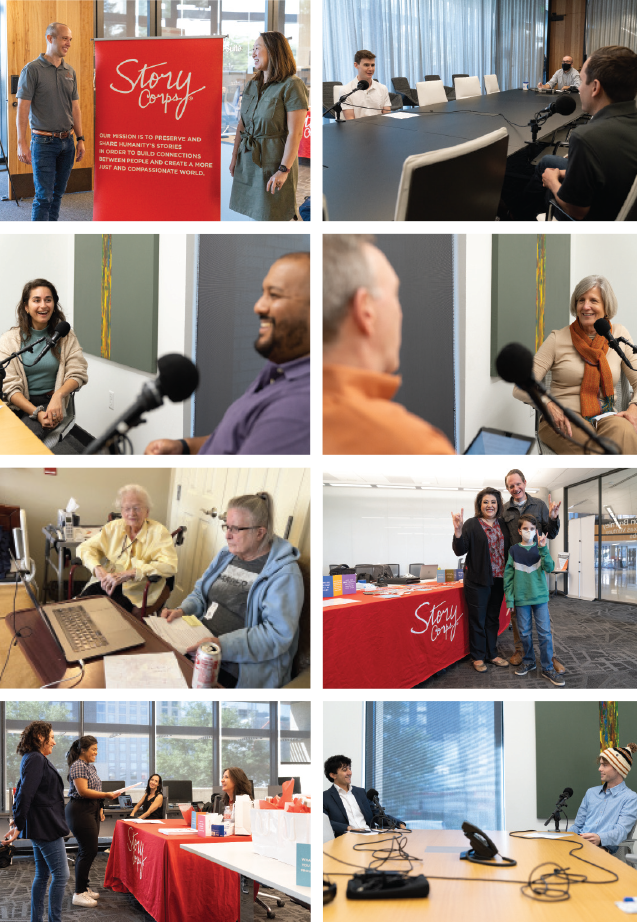
preserve, and share the stories of Americans from all backgrounds and beliefs. Its producers brought their microphones to McCombs for two weekends during fall 2022. “When we started with McCombs, we created
a shared vision — wanting to take on misconceptions about business school and highlight the spirit of McCombs,” says Sarah Krauss, a StoryCorps account manager who helped produce the recordings. Among those who took part was Shudde Fath, the school’s oldest alum at the time of recording
at age 106. She was joined in conversation with her daughter, Betsy Fath
Hiller, two months before Fath’s death in December.
Everyone Has a Story
The following excerpts give a flavor of the insightful conversations that make StoryCorps iconic. Listen to their stories in full at “Voices of McCombs,” a special webpage hosting all 19 conversations.
FRIENDS
Tamara Fields, BBA ’06
Andrew Phong Vo, BBA ’95
Fields and Vo are friends, executive colleagues at Accenture, and McCombs alums. Both have served on the McCombs Advisory Council, and Vo, a Vietnam refugee as a small child during the 1970s, is a McCombs Hall of
Famer, known for his generosity. Fields and Vo shared what McCombs taught them.
Fields: How did you find out about UT?
Vo: As a first-gen student, I didn’t have my act together whatsoever. My parents had never gone through the college admissions process. So, I got a late start and ended up at the University of Houston. In my first semester, I said to myself, “There has to be something bigger, bolder — somewhere I can achieve my dreams.” After doing research and talking to friends, I said, “It’s the University of Texas.” I convinced my parents to let me fly the coop
and spread my wings. I spent three amazing years here.
Fields: From the get-go, I had an awesome time in McCombs. I felt like I was part of a larger world. I was excited and full of joy. McCombs has done a lot of great things for me, but one of them was creating a strong base of friends, who I am very close to today, and a network that I just could not imagine how much it would mean in my life and career. It’s a big school to
learn how to navigate, but it teaches you how to do that. I don’t think any school has a better career services center. It taught me how to do my résumé. It taught me how to do interviewing. It taught me how to show up and transition into adulthood.
Vo: I learned at McCombs the importance of giving back, of supporting that next generation. I want to provide the students that are coming up the opportunity to thrive, to shine, to achieve their aspirations and ambitions.
Fields: You talk about being bold and challenging yourself. There were a couple of ways that I can say that McCombs did that for me. I had an internship in Boston. So, I had to get there by myself. I had to find a place to stay. I had to figure out how to get around the Northeast. So, what I really appreciated was that McCombs gave me experiences to challenge myself, and it was the first time I recognized that I could be independent and do it on my own. If I had never done that internship, I never would have done
my study abroad in London. These experiences cannot be traded.
Vo: That international and cultural immersion that we had as undergrads has helped us in our day-to-day lives. I never envisioned when I joined Accenture in ’95 and you joined in ’96 we would be here today. I’ve been in Singapore for the past five years, and the lessons and values that I learned as an undergraduate — about appreciating people from all walks of life and
working in teams — is that, together, you can solve big problems and achieve big things.
Fields: I just have to say thank you, McCombs. Thank you for the connection that you gave me with Andrew Vo and for our shared passion for this school and our commitment to bringing others along on this journey. I think all we can say is Hook ’em!
Vo: Hook ’em Horns!
Listen to the full conversation:
FAMILY
Maria De-Arteaga, IROM Assistant Professor
Husband Benedikt Boecking
De-Arteaga, a Colombian native, brings diverse experiences to McCombs as an assistant professor in the Information, Risk, and Operation
Management Department. A former journalist, she specializes in machine learning and policy. She earned a doctorate at Carnegie Mellon University, where she met Boecking, a fellow doctoral student and now her husband.
He interviewed De-Arteaga about her work.
Boecking: What is your research?
De-Arteaga: My research focuses on AI ethics and human-AI collaboration. So, primarily, I’m interested in the risks and the opportunities when we’re using machine learning for decision support. The other core area of my work is “algorithmic fairness,” how machine learning may replicate and compound societal biases.
Boecking: How did you choose McCombs as a place where you could do this research?
De-Arteaga: When I went on the job market, it was not very clear what type of department I was a best fit for because I was very interdisciplinary, and that’s not always how academia is structured. I considered computer science, information schools, a couple of policy schools, and a few business schools. When I visited the department where I am now, I really liked the
multidisciplinary nature of people here. You had statisticians, psychologists, economists who were thinking about problems from very
different perspectives. I wanted a place that wouldn’t force me to choose between one (field) or the other, and where, ideally, people around
me could understand and appreciate the different types of questions I study. I really felt this is a great place for that.
Boecking: Were there any surprises?
De-Arteaga: I found advising students very intimidating. It’s different in research to pursue an idea when you’re taking a risk yourself. But taking someone else on that journey was very terrifying. It’s now one part of my job that I enjoy the most.
Boecking: What are the important topics in data and AI ethics for a business school?
De-Arteaga: McCombs’ slogan is “Human Centered. Future Focused.” It’s very funny whenever I use the McCombs slides in my talks because it really feels like a slogan about my research. It’s a visual reminder of what a good fit this is. We’re training students to think about the ethical and societal implications of what they’re doing. I am really excited about bringing my
research into the classroom and making that a part of how we’re training students.
Listen to the full conversation:
CLASSMATES
Jine Uzor, BBA ’23
Michelle Ivbievbiokun, BBA ’25
Uzor, a McCombs graduating senior and president of the Black Business Students Association, and sophomore Ivbievbiokun, a member of BBSA’s executive board, bonded after meeting at a BBSA event. Both are of Nigerian heritage and found sanctuary in their friendship.
Ivbievbiokun: What would you say your favorite memory is of McCombs?
Uzor: The alumni event.
Ivbievbiokun: With Peggy Drake?
Uzor: Yes. We were expecting maybe 20 max to attend the event, and we got about 80 people responding back. It was amazing. Out of those 80 people, we had Peggy Drake Holland respond, who is the first Black graduate of McCombs. We also hosted the event in a room dedicated to her called the Peggy Drake Holland Lounge. So, it was a full-circle moment when she was
there with her husband, Leon Holland. She was so excited. She said she’s been waiting for the opportunity to connect with other students. It really meant a lot to me, and to see how engaged the alumni were and how much they really want to help other Black students, it almost brought tears to my eyes.
Uzor: Michelle, what would you say is a challenging part of being at McCombs?
Ivbievbiokun: Coming to McCombs and UT in general, I was mostly worried about being behind the curve or feeling like I didn’t belong,
which is, I guess, the whole imposter syndrome thing they discussed with us before school even starts. I would say it still affects me sometimes when I’m in other orgs besides BBSA because these people don’t look like me
or they don’t understand where I come from. At the same time, I’m trying to overcome it by just understanding: This is how the world is going to be. Everybody here is so nice and kind and willing to help. So, I never feel like, “Oh, I’m less than someone else,” or, “I don’t belong here or don’t deserve to be here.” I’m really glad that I came here. I can’t imagine myself at any other school. I just love McCombs.
Uzor: Same. At BBSA, the whole thing we’re trying to do is build this community. Community is the most important thing. That’s what’s
going to last.
Listen to the full interview:
This story appeared in the Fall 2023 issue of McCombs magazine.
About this Post
Share:
